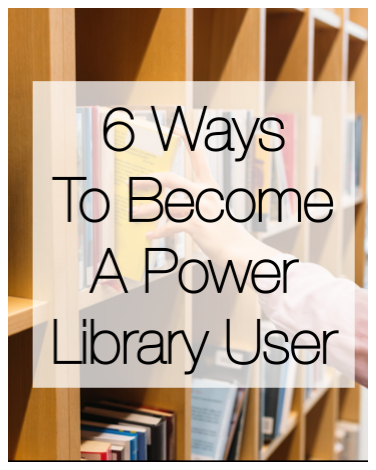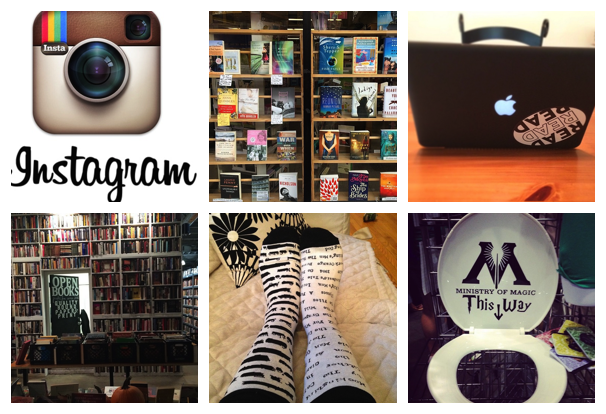
6 Ways To Become a Power User of the Public Library
You have a library card and you know the library is more than just a “Netflix for books.” Maybe you know about your library’s ebook offerings and maybe you know you can borrow audiobooks or DVDs. But how can you make the absolute most out of your local library? Here are 6 tips for becoming a power user of the public library.
Worth noting: not all public libraries offer the same services, so not everything mentioned here will be available to all users. Some libraries offer more and some may offer less. These variations exist because of funding differences, library size, location, and a host of other factors, most of which are out of control of the library itself. The one common denominator among these tips, though, is that they’re all things you can ask about at your library.
Likewise, this is geared toward the American public library system, so your mileage in other countries may vary.

Did you know many libraries order books well in advance of their publication date? Librarians are knowledgable about what’s coming out, and they often put in purchase orders for titles weeks, if not months, before publication. This is especially true for books that are garnering buzz or are new titles by popular authors.
Many times, those titles appear in the library catalog not long after the order is placed. Even if the book isn’t on shelf, when the library has ordered a title and it shows up in the catalog, chances are good you can put a hold on it.
Say you’re reading our 5 To Watch For feature and you see a title coming out at the end of the month that looks great. Go to your library’s catalog and see if you can put a hold on it. If you can’t do the hold from home, call the library and try to do it over the phone. This’ll get you ahead of the game, and you’ll be one of the first people to read the book, likely not long after it releases.
(Oh, and if you haven’t checked out the new monthly series we’re doing on Book Riot’s YouTube channel, “Ready, Set, Hold,” you should — we’re giving you months-out previews for books you can look for to put on hold ahead of time).
2. Request titles for purchase
Public libraries serve the interests of their particular communities, and librarians know what books do well and which ones don’t. One way they know this is through what people are checking out. Another way they learn what people are interested in is through what they’re asking for.
Many libraries allow you to request titles for purchase. They may have a comment card for you to fill out, an online form for you to submit, or talk to someone at the library and ask in person. If there’s a book you’re looking for that’s new — emphasis here on new, since public libraries tend to purchase new titles, rather than seek out backlist titles — and you don’t see it in the catalog nor do you see it on shelf, make a request that it be purchased. Often it will be and you’ll often be the first person who is able to get it.
This request process can be extremely helpful for collections within the library that aren’t the mainstream fiction or non-fiction. It can be challenging for librarians without expertise to find solid reviews and catalogs for smaller-press or genre/comic titles. Some libraries may not have experts building a young adult or business or audiobook collection.
Use this judiciously. Don’t be the person who comes in and requests a book for purchase all the time. Trust librarians know how to do their job. Trust that things are and are not purchased for a reason. The library will buy the latest Patterson title (multiple copies, probably), but they may not know about an urban fantasy series starting up by an author who has been gaining a following with genre fans.
Talk with the librarians and get to know your library’s collection. The worst thing that happens when you request a book is it isn’t purchased.
3. Make use of the Interlibrary Loan System – and respect it
Since the public library can only carry so much, since its focus is not on being an archive or repository for all books, and because the collection is tailored to the community being served, sometimes you want a book and it’s no where to be found. Rather than request it for purchase, ask about interlibrary loan.
The interlibrary loan system (ILL) is a country-wide, interconnected system of libraries that agree to lend items to one another. The libraries within the system include public, academic/college, and special libraries, meaning the pool of available titles is massive. If you’re looking for a rare book or a specialty title, your library may be able to track it down and request it for you via ILL.
ILL is different from loans that originate within whatever library system to which your particular library may belong. This can be confusing, but many libraries are connected to other libraries regionally. Chicago Public Library, for example, is a system composed of numerous branches, so items can be shared among the different in-system libraries and have the same due dates and borrowing policies applied to them. A more rural library may be part of a larger regional system — county wide, multiple counties wide, or even state-wide — and sometimes the due dates and borrowing policies may differ. Those tend to be where librarians will look for an item first, before looking at options through ILL.
Due dates and restrictions on materials through ILL come from the library that owns a title, which means that sometimes, you’ll only be able to check it out for one week or the item may only be available for use within the library you use. Sometimes an ILL can take weeks or months to arrive because it may be arriving from the other side of the country.
Be patient and respectful of the system. ILL is costly to and for libraries (in staff and in finances) but it’s a service meant to connect people with the items they’re looking for. Libraries may set restrictions on ILL use because items can be found through other venues, like regional systems, first. They may also restrict ILL use to books that are more than a year old, requesting instead you put in a purchase request so the items are considered for purchase.
4. Get to Know Your Databases
Did you know most libraries have a variety of really useful databases available to you as a cardholder? Much of the material within these databases can be accessed from home at all times of day.
Ebook and eAudiobook services often come through a database (OverDrive or 3M or other similar vendors). You login with your library card number and a password, then you’re able to browse, request, place holds, and download what you’re interested in. If you don’t know whether your library offers ebooks/audiobooks, search around their website or ask. Sometimes, the entire range of digital items don’t appear in the online catalog.
There are other databases worth exploring, too.
Check out your library’s website or head into the library in person and either look for a brochure with information about the databases or ask the librarian. Previous libraries I’ve worked at have had databases that included car repair manuals, popular magazine and academic articles, foreign language tutorials, genealogy, and more.
Your tax dollars pay for these services and they’re amazing resources. What you find there is often more solid than a Google search when it comes to research.
Also, when you know how to use them, you don’t have to leave the house nor wear pants.
5. Know the Special Collections
You know how to request books and get to the top of the holds list, you know how to download ebooks, and you know how to use a wide variety of databases. But do you know the extent of the special, unique items your library may have available to check out?
Public libraries do more than books, movies, music, and audiobooks. Your library may have a special or small collection of other items available for check out. With technology changing and shifting, libraries are savvy about how to make some of these tools and toys available to the public — it’s a way for users to test these out before making a commitment. Some libraries lend ereaders or tablets, Roku boxes, video gaming consoles or games, and even digital cameras. Restrictions and limitations on these items is likely different than the general collection, but libraries offer them because they know there’s an interest. Ask about them.
There are other items that might be available for checkout, too, that aren’t new or flashy, including cake pans, home energy usage meters, binoculars, telescopes, passes to local theme parks, and more. These items are often in the library catalog, but it might take asking a librarian to know the extent of unique items available to borrow.
6. Get Book Recommendations
Speaking of asking a librarian, if you are seeking out book recommendations and want them tailored to your interests and needs when you walk in, then you have no better resource than the librarian.
Librarians know how to recommend a book. They know how to find you the next great thriller that will hit all the same notes with you as a reader than Gone Girl did. They can help you get started on an entirely new genre or take you deep into a genre you already love but want even more from. While not every librarian is an expert in every reading taste, every librarian knows how to find information for you, either from colleagues or through his/her own research abilities.
Librarians respect your tastes and your privacy. While you may be asked questions about what you like or don’t like, the librarian isn’t judging you. If you ask for something and are blunt about what you like or don’t like, you’re not being judged either. Trust the librarian has heard things far stranger, more disturbing than anything you can come up with. They’re not going to tell you about it, though.
Can’t make it in person to the library? Chances are, your library has a way you can reach them online, too, either via email or via a texting/chat service. While you may not see a question about what to read if you loved Sue Grafton an important question, librarians do. And they’ll be eager to answer it for you, whether you end up coming into the library and checking out the recommended books or not.
That’s their job.
____________________
We run a pretty sweet little bookish Instagram account, if we do say so ourselves (and we do). Come check it out.
















